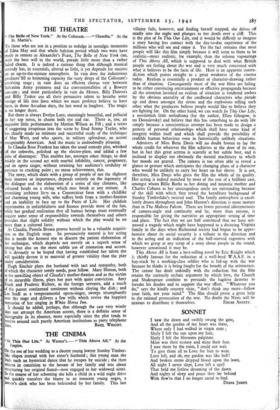THE THEATRE
The Belle of New York." At the Coliseum. " Claudia." At the St. Martin's.
To those who are not in a position to indulge in nostalgic memories of Edna May and that whole halcyon period which two wars have made as remote as Alexander's Feast, The Belle of New York can, with the best will in the world, parade little more than a rather faded charm. It is indeed a curious thing that although musical comedy has, in essentials, altered so little, it yet depends for success on an up-to-the-minute atmosphere. In vain does the industrious producer fill to brimming capacity the vasty deeps of the Coliseum's revolving stage ; in vain does an efficient chorus veer between Salvation Army primness and the conventionalities of a Bowery can-can ; and most particularly in vain do Messrs. Billy Danvers and Billy Tasker use all their persuasive talent to breathe some vestige of life into lines whim we must perforce believe to have been, in those Arcadian days, the last word in laughter. The magic Is no longer there.
But there is always Evelyn Laye, stunningly beautiful, and pellucid in her top notes, to charm both eye and ear. There is, too, an exquisite little performance by Marion Wilson as Fifi ; and a series of staggering irruptions into the scene by Enid Stamp Taylor, who has clearly made an intimate and successful study of the technique of Mae West, and who sports, in solitary splendour, an accent recognisably American. And the music is undoubtedly pleasing.
In Claudia Rose Franken has taken the usual comedy plot, whisked off the cobwebs, polished up the electro-plate, and added a few dabs of distemper. This enables her, amongst other things, to deal briskly in the second act with marital infidelity, cancer, pregnancy, and an opera singer, without straining her audience's credulity or patience to cracking point ; no mean achievement, this. The story, which deals with a group of people of not the slightest basic interest or importance, depends entirely on the ingenuity of the dialogue and the elaboration of a series of tiny climaxes, like coloured beads on a string which may break at any minute. A promising architect lives on a Connecticut farm with a childlike and charming young wife, who suffers both from a mother-fixation and an inability to face up to the Facts of Life. Her childish experiments in unfaithfulness and finance provide most of the fun, while her gradual realisation that all human beings must eventually acquire some sense of responsibility towards themselves and others provides that slight solidity without which the play would be no more than a cultured farce.
As Claudia, Pamela Brown proves herself to be a valuable acquisi- tion to the English stage. So persuasively natural is her acting that it needs the keenest eye to discern the patient elaboration of her technique, which depends not merely on a superb sense of timing but also on the most subtle use of intonation and accent. It is devoutly to be hoped that having established her talent she will quickly devote it to material of greater validity than the play under consideration. Hugh Sinclair plays the husband with tact and sympathy, both of which the character sorely needs, poor fellow. Mary Hinton, both as the unwilling object of Claudia's mother-fixation and as the victim of art incurable illness, plays her part with quiet conviction. Amy Frank and Frederic Richter, as the foreign servants, add a touch of the purest continental sentiment without cloying the dish ; and Lea Seidl as a temperamental opera-singer, sweeps triumphantly over the stage and delivers a few trills which revive the happiest memories of her singing in White Horse Inn. It should be added, perhaps, that although the cast very wisely does not attempt the American accent, there is a definite sense of incongruity in its absence, more especially since the plot tends to revolve around such purely American institutions as party telephone


























 Previous page
Previous page